Music

Subject leader: Mrs Kerry
Contact email: pennowethks1@croftymat.org
Our music curriculum intent
‘Music gives a soul to the universe, wings to the mind, flight to the imagination, and life to everything.’
— Plato —
At Pennoweth, children gain a secure understanding of what music is through listening, singing, playing, evaluating, analysing, and composing across a wide variety of historical periods, styles, traditions, and musical genres. Our aim is for all children to develop an inquisitiveness for Music, as well as an understanding and acceptance of the validity and importance of all types of music. We are committed to ensuring children understand the value and importance of music in the wider community, and are able to use their musical skills, knowledge, and experiences to involve themselves in music, in a variety of different contexts.
Taken from Cornerstones, our curriculum is taught in blocks across a two-year cycle in order that children achieve depth in their learning. Key knowledge, skills and associated vocabulary have been identified and these have been mapped across the school to ensure progression. At the start of each unit, teachers establish the starting point for each child and ensure that all lessons taught are relevant and developmental, and consideration is given to how greater depth will be reached within each lesson, as well as how learners will be supported in line with the school’s commitment to inclusion.
Our curriculum ensures children experience singing, listening to, playing, performing and evaluating various genres of music. Through the effective teaching of music, children are encouraged to use some of the language of music to dissect it, and understand how it is made, played, appreciated and analysed. Children also learn how to compose focusing on different dimensions of music. Composing or performing using body percussion and vocal sounds is part of our curriculum, developing an understanding of the various musical elements without the complexity of an instrument.
Wherever possible, children will support musical events within the community, including the Festival of Light, Murdoch Day celebrations and the St. Piran’s Day Parade. As part of these events, children will purposefully showcase their musical talents and skills to a wide audience.
DNA
The culture of our DNA at Pennoweth also supports the teaching of music.
The planned progression of music as the children move through the school allows them to grow in confidence with their musical knowledge and ensures our children always feel safe and comfortable. The children are encouraged to see mistakes as a learning opportunity so they feel comfortable when this happens in the classroom. The lessons are planned to ensure that every child is included in every lesson, this combined with the help and support they receive from all adults and children helps them to feel loved. The children are often given a choice on how to present their learning and are given regular opportunities to work independently, helping them to feel be responsible for their own learning. With music based around a project the children are always engaged and motivated with their learning. The use of sticky strips helps them to quickly pick up new knowledge that they can recall at a later date. Finally, our children are ready. Ready to be independent learners who can apply their knowledge in a range of situations and contexts.
What will my child experience through music at Pennoweth?
Throughout the year, children are given various opportunities to experience music. Each term, there is a musical genre focus, such as classical music, where children regularly have a chance to listen to and appreciate this. There are also a number of music mornings where performers are invited in, so that children can see live music. The children also have a chance to explore the instruments where there is a focus on the appropriate musical vocabulary. Additionally, they learn about an aspect of music, such as types of instruments and answer VIPERS questions on these. They are also able to enjoy a picture book which has a music focus. Each term, there are two singing assemblies where the whole school learn the same songs, and learn about the importance of posture and projecting our voices when we sing. There is also a performance at Christmas and at the end of the summer term.
Nursery
In nursery, there is a focus on remembering and singing familiar songs. Children are asked to match someone’s pitch and recognise if a sound is high or low. They have access to a box of instruments where they can create their own music and express themselves. Also, there are a number of cross curricula links with children being introduced to songs in maths and those linked to stories.
Reception
Music comes under the early learning goal of ‘expressive arts and design’. The children are given opportunities throughout the day to express themselves through music. They have access to a box of instruments which is regularly rotated to allow them to investigate sounds. This also gives children a chance to move and dance to the music that they are creating and be imaginative and expressive. There are also chances for children to make their own instruments such as shakers. In class, children regularly sing a range of well-known nursery rhymes and songs. They are able to listen to the music and talk about how it makes them feel, what they like and what they dislike. Alongside this, there are also a number of cross curricula links with songs being used in maths, for stories and linked to projects. Children are regularly able to perform to their peers as well as in assemblies and Christmas performances.
Year 1
KS1’s music project this year is called ‘Rio de Vida’ which centres around Brazil and carnivals. The project starts with the children listening to music from Brazil with a particular focus on percussion instruments. They will then write a class song to a well-known tune that describes a Brazilian mythical creature. Over a number of lessons, they will practise this to create a polished performance at the end of the project using percussion instruments to accompany their singing. In the summer term, the children also have a music lesson from a specialist teacher where they will be given the chance to sing and explore instruments.
Year 2
Year 2’s music project this year is called ‘Beat Band Boogie’. This project starts with the children listening to different styles of music including samba, blues and classical and thinking about how it makes them feel. They then look at different types of instruments and see if they can recognise them in a piece of music. Next, they look at different melodies and compare them using musical vocabulary. Throughout the project, the children have the chance to use instruments, their voices and body percussion to create different sounds and think about the effect these have. In summer term, the children have recorder lessons from a specialist music teacher.
Lower KS2
Lower KS2’s music project this year is ‘Playlist’. At the start of the project, the children listen to two different pieces of music, discuss the instruments that they can hear and compare and evaluate them. They also learn about formal notation and use this to play a song on the glockenspiels and experiment with different instruments. The children then compose a song on the glockenspiel and record it using this notation. They learn about the importance of warming up when singing and practise doing this. Finally, after warming up the children practise singing different songs with a focus on call and response songs. In spring term, the children have ukulele lessons from a specialist music teacher.
Upper KS2
Upper KS2’s music project for this year is ‘A Child’s War’. The children start the project by listening to a range of sounds from the war, including air raid sirens, bombing, Spitfires, the Blitz, gas mask drills and ‘all clear’ sirens. They then explain how these sounds make them feel when they hear them. Throughout the project, they have the chance to learn to sing popular wartime children’s songs such as Run Rabbit, Run, It’s a Long Way to Tipperary and Pack Up Your Troubles in Your Old Kit Bag. Using one of these songs the children then change the lyrics to fit in with their class novel ‘Good Night Mister Tom.’ In summer term, the children have ukulele lessons from a specialist music teacher.
What musical skills and knowledge will my child learn at Pennoweth?
What sort of musical language will my child learn at Pennoweth?
What do Pennoweth’s children think about music?
Year 1 children have said the following about music:
‘I like Wolfgang Mozart. I like listening to his songs.’
‘I like doing different patterns. I like playing the triangle.’
‘I like using our voice in different ways, high, low, quiet and loud.’
‘I liked when we first sang the new song. It’s called fearless hero. I liked it because it is very challenging to sing. I like listening to and responding to the music.’
‘I like learning about the notation which is when music is written down. I like writing our own notiation.’
‘I liked the rap lesson because we all got to work together as a team.’
Guitar lessons.
Guitar lessons are available in school through Cornwall Music Service Trust. The different lesson options can be seen below:
Group Type 1 (£5.63) – Based on a group of 4 for 30 minutes. Total group time length variable on size, 7.5 minutes per pupil on an individual basis.
Group Type 2 (£7.50) – Based on a Group of 2 for 20 minutes. Total group time length variable on size, 10 minutes per pupil on an individual basis.
Individual 20 Minute (£15.00)
Individual 30 Minute (£22.50)
If you are interested in signing up your child, please use the following website: https://cmst.co.uk/. If there are no spaces available then you will be placed on a waiting list.
Performances
Cornwall Orchestra
We had a brilliant morning listening to visitors from the Cornwall Orchestra. The children enjoyed listening to different woodwind instruments such as flute, clarinet, oboe and the bassoon. We were very impressed with the number of instruments that Katherine could play. We heard songs that we recognised such as Harry Potter and Frozen.
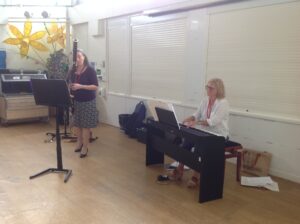
Will Keating
We all had a brilliant day with Will Keating doing music workshops. We finished the day with a whole school performance of Cornwall my Home.
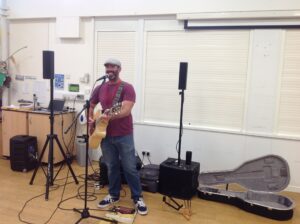
Redruth School
We were lucky enough to have several students from Redruth perform to us on the flute, guitar, drums and keyboard. They were all fantastic and lots of the children were eager to start learning an instrument after listening to them.
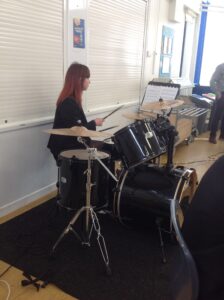
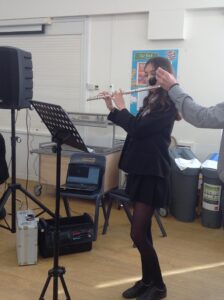
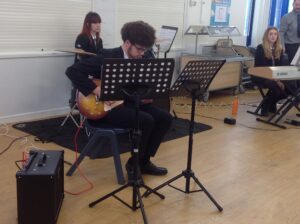
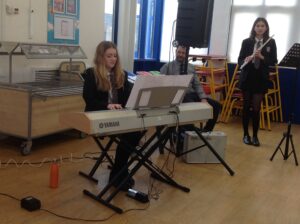
Figurehead
We were all very excited when a local sea shanty band called ‘Figurehead’ came in to perform to the children. We all enjoyed singing along to the songs we recognised, especially ‘Wellerman’!
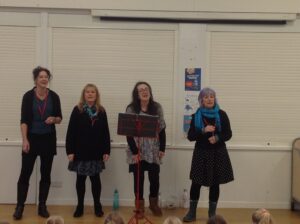
Useful music websites and links
BBC Bitesize – KS1
